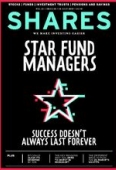Archived article
Please note that tax, investment, pension and ISA rules can change and the information and any views contained in this article may now be inaccurate.
The case for and against share-based compensation

Following on from our discussion of the importance of corporate governance and business ethics, and how short-term reporting can distract management from focusing on long-term goals, this week we look at an issue which touches on both topics: share-based compensation for directors.
Executive pay and share-based compensation have been the subject of debate for years among academics, politicians and the media, with many people blaming the financial crisis in part on excessive levels of ‘incentives’ for management teams to boost short-term returns.
At the heart of the compensation debate is the issue that if the ‘ownership’ of a company and managerial control are kept separate, the interests of the managers may diverge from the interests of the shareholders, who are the ultimate owners.
Therefore many companies use performance-related pay to align the interests of management with those of shareholders, more often than not with a specific link to earnings per share or the price of the company’s stock.
Linking executive pay to a company’s operating performance isn’t as simple as it sounds. There are myriad ways that a company can boost its performance to hit earnings or ‘total shareholder return’ targets.
As Howard Marks, the founder of Oaktree Capital Management, puts it, the stewards of a company should be ‘purer than Caesar’s wife’ and resist the temptation to do business in a way which moves a little extra money from shareholders’ pockets into their own.
NICE LITTLE EARNER
Due to widespread opposition to company bosses receiving huge salaries, the majority of executive pay tends to be in the form of performance-driven share awards or bonuses. In the US as much as 90% of executive pay can be performance-related.
When executives are incentivised to increase a company’s earnings, dividends or share price (or all three together in the case of total shareholder returns), it is no surprise that executives start chasing short-term performance.
To quote Marks again: ‘When profit maximisation is exalted to excess, ethics and responsibility can go into decline. The pursuit of short-term profit leads to actions which are counter-productive for others, for society and for the long run.’
At their worst, skewed incentives and short-termism can lead to over-leverage and poor risk management, generating asset bubbles. The bigger and more complex the business, the more obstacles to monitoring and regulating executive pay.
At the same time, investor expectations have changed over time. Private investors, who used to dominate the shareholder registers and took a passive, long-term view, have given way to big institutions who typically push for high returns in a shorter time.
INVESTORS HAVING A LOUDER VOICE
The good news is that investors, helped by groups such as Pensions & Investment Research Consultants (PIRC) and Institutional Shareholder Services (ISS), are getting bolder in blocking excessive share-based pay awards.
Last week a quarter of shareholders voted against B&Q owner Kingfisher’s (KGF) outgoing chief executive’s bonus payment of £522,000. Veronique Laury, who was paid almost £1.8m last year, up from £1.6m in the previous year, resigned from the firm without having met her target of improving profits by £500m by 2021.
Kingfisher has agreed to discuss the payment with its investors and provide a response within six months. Meanwhile other investors withheld their vote on the pay of the whole Kingfisher board.
Shareholder pressure and public outrage saw housebuilder Persimmon’s (PSN) former chief executive get a trimmed-down bonus – although £75m is hardly penny-pinching – and eventually the boot last year, while the most public spat over management pay has to be at media giant WPP (WPP).
Despite repeated shareholder revolts during his tenure, WPP’s chief executive and founder Martin Sorrell is estimated to have pocketed well over £200m in executive pay, including share-based compensation, between 2012 and 2018 when he left the firm. Even his leaving package was opposed by shareholder groups.
How Humana gamed the system
In late 2014, when US health insurer Humana reported worse than expected quarterly results, it sweetened the pill with a $500m accelerated share buyback.
What investors didn’t realise was that the buyback, which instantly reduced the number of shares in issue, increased earnings per share (EPS) by the 2c it needed for the firm to beat its $7.50 quarterly profit target.
That meant that even though earnings were short of forecasts, the chief executive was able to trouser a $1.7m bonus on top of his salary for 2014.
Humana had already changed its calculation of EPS in 2014 by omitting losses from paying down debt, to try to bring earnings as close as possible to its target level of $7.50.
Without the buyback however, which didn’t need shareholder approval, it wouldn’t have got over the line.
The moral of the story is the next time a company in which you own shares proposes a buyback, look and see how much the management stand to benefit.
Important information:
These articles are provided by Shares magazine which is published by AJ Bell Media, a part of AJ Bell. Shares is not written by AJ Bell.
Shares is provided for your general information and use and is not a personal recommendation to invest. It is not intended to be relied upon by you in making or not making any investment decisions. The investments referred to in these articles will not be suitable for all investors. If in doubt please seek appropriate independent financial advice.
Investors acting on the information in these articles do so at their own risk and AJ Bell Media and its staff do not accept liability for losses suffered by investors as a result of their investment decisions.

 magazine
magazine









